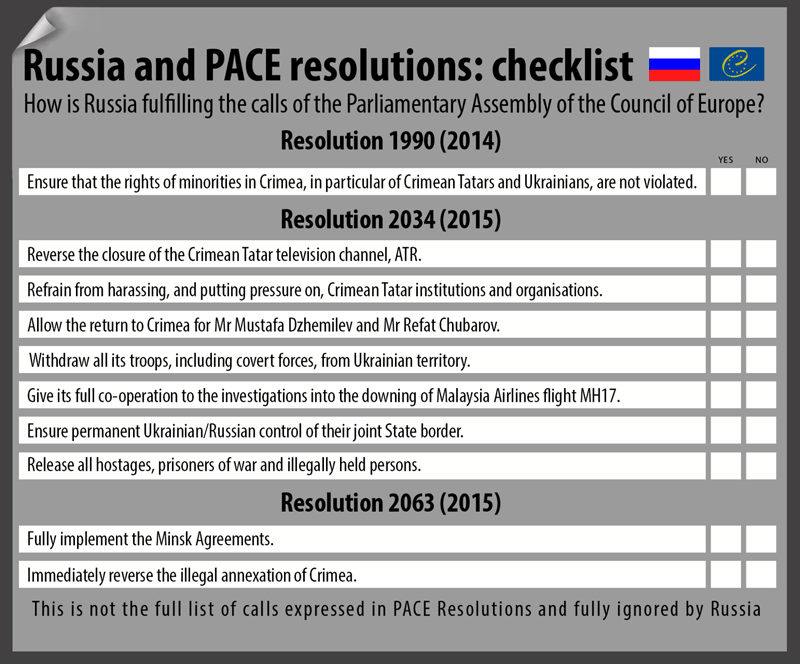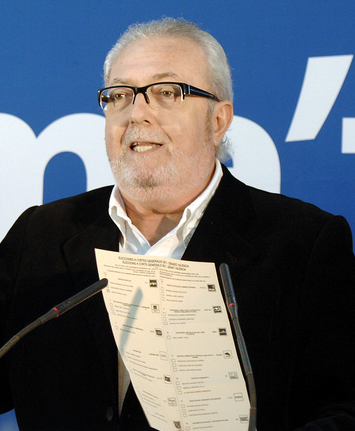On 9 March 2017, Ukrainians living in Spain protested against the Russian delegation participating in a Parliamentary Assembly of the Council of Europe (PACE) meeting despite sanctions, Euromaidan SOS reported.
That day, a meeting of the PACE Bureau was attended by a Russian parliamentary delegation for the first time since 2014. It was headed by the State Duma deputy Leonid Slutsky, who is sanctioned by the USA, EU, and Canada over his role in the so-called referendum after which Russia illegally annexed Ukraine's Crimea peninsula in March 2014.
The delegation of the Russian Duma will attend PACE meetings during 9-10 March on the personal invitation of PACE President Pedro Agramunt. But its return was spoiled by representatives of the Ukrainian community in Madrid who held a peaceful rally near the Senate building. They were holding red cards, whistles, football attributes and met the participants by chanting "Russia is not welcome."
Although the Russian delegation didn't react, Spaniards themselves expressed their support by turning on the Ukrainian anthem in the building standing behind the protest participants.

The participants of the rally noted that Russia isn't fulfilling a single PACE resolution regarding Russia's illegal annexation of Crimea and aggression in eastern Ukraine. Moreover, Russia's crackdown on freedom continues in occupied Crimea, and there is a spike in violations of the Minsk agreement which is called to negotiate peace between Ukraine and the Russian-backed forces in Donbas.
This checklist shows how Russia responded to the three resolutions PACE has issued towards it over 2014 and 2015 – resolution 1990, 2034, and 2063.

In 2016 and 2017, PACE adopted two other resolutions concerning Russia's actions in Ukraine: on 12 October 2016, PACE adopted resolution 2133 and 2032, which clearly states that Russian troops have to be withdrawn from the territory of Ukraine, that the war in Ukraine is not a “Ukrainian conflict” but “Russian aggression,” and elections in Donbas are not possible in the current situation. It declares that Russia bears full responsibility for the occupied territories and rules out the return of the Russian delegation to PACE before the Minsk agreements are implemented and territorial integrity of Ukraine is restored.
And on 24 January 2017, PACE adopted resolution #2141 titled "Attacks against journalists and media freedom in Europe," which calls among other things to drop criminal charges for "separatism" against Ukrainian journalists who spoke out against the illegal annexation of Crimea and release two political hostages, Roman Sushchenko and Oleg Sentsov.
Russia's participation in PACE was suspended on 10 April 2014, when the assembly decided on suspending the Russian delegation’s voting rights over Russia's illegal annexation of Crimea. In response, the Russian parliamentary delegation ceased its cooperation with PACE. In January 2016 and 2017, Russia did not send lists of its delegation to Strasbourg, effectively avoiding repeated voting on Russia's status in the Assembly.
PACE President Pedro Agramunt wants to return Russia

However, there are initiatives underway to return Russia's presence to the Assembly. In January 2017, PACE President Pedro Agramunt publicly spoke of his intention to bring the Russian delegation back to PACE and lift PACE's Crimea-related sanctions on Russia, insisting on the necessity of a dialogue. "Russia's absence in this [PACE] hall doesn't serve anybody," said Agramunt on 23 January 2017 after his re-election. The same day, he said that the dialogue with Russia must continue despite the ongoing illegal annexation of Crimea and that while this is a decision that only the Assembly as a whole can make, he will personally continue efforts to restore the delegation's presence in PACE.
Yevropeiska Pravda wrote that one of the ways that this can be done is by initiating a PACE summit. An attempt to restore the Russian delegation was made in 2015 when the Russian delegation headed by Duma speaker Naryshkin was met with a rebuttal: PACE not only prolonged the sanctions against Russia but extended them. Russia was prohibited from voting, heading any organs of the Assembly, and taking part in monitoring missions.
However, during one of Agramunt's visits to Moscow, an agreement was reached stating that the Russian delegation will return if the rules are changed and Ukraine will have no practical way to oppose the move.
Russia-supporting MPs even prepared a project of relevant changes to the PACE regulations, but the October 2016 session showed that there are little chances for it to be adopted in the Assembly.
The summit planned for 2019 is one of the venues at which the Russian delegation may be returned.

